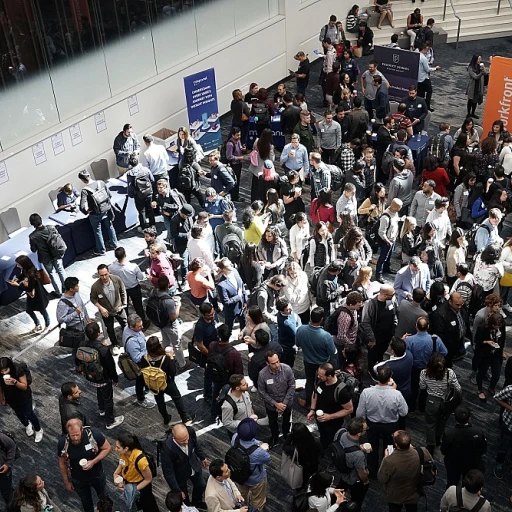
Understanding performance success strategies in AI for HR
Defining Performance Success in the Age of AI
Performance success in human resources is evolving rapidly as artificial intelligence becomes more integrated into the management process. Traditionally, organizations have relied on periodic performance reviews and static goal setting. Now, AI-powered strategies are enabling more dynamic, continuous feedback and real time insights, supporting both managers and employees in their pursuit of high performance.
Key Elements of Effective Performance Strategies
To achieve organizational success, it is essential to establish clear goals and align them with the overall culture and values of the organization. AI tools can help managers identify patterns in employee performance, streamline feedback, and promote continuous improvement. This shift from annual reviews to ongoing check ins and continuous learning fosters a culture of growth and employee engagement.
- Continuous feedback: AI systems enable managers to provide real time feedback, making the process more effective and timely.
- Goal alignment: Linking individual and team goals to organizational goals ensures everyone is moving in the same direction.
- Employee development: Data-driven insights help identify skill gaps and opportunities for continuous learning and development.
- Management strategies: AI supports managers in adopting management strategies that are adaptive and responsive to employee needs.
Integrating AI into Performance Management
AI is not just about automation; it’s about enhancing the management strategy to drive effective performance and employee growth. By leveraging AI, organizations can create a more transparent and fair process for performance management, ensuring that feedback is unbiased and actionable. This approach helps build a culture of trust and continuous improvement among team members.
For a deeper look at how AI can enhance performance management processes, including practical templates and tools, explore this resource on performance improvement plan templates.
Aligning AI tools with HR goals
Integrating AI Tools for Clearer Goal Setting and Alignment
Aligning artificial intelligence tools with HR goals is a critical step for organizations aiming to achieve high performance and continuous improvement. When AI solutions are thoughtfully integrated into the management process, they can help managers and employees clarify objectives, streamline feedback, and support effective performance management strategies.
AI-powered systems can assist in setting clear, measurable goals that are directly linked to organizational success. By analyzing historical performance data and current trends, these tools help managers identify areas for employee development and align individual objectives with broader organizational goals. This approach not only enhances employee engagement but also fosters a culture of continuous learning and growth.
- Continuous feedback: AI platforms enable real time feedback and ongoing check ins, making it easier for managers and team members to address challenges and celebrate successes as they happen.
- Performance reviews: Automated systems can streamline the performance review process, ensuring that reviews are consistent, unbiased, and focused on continuous improvement.
- Goal tracking: AI tools provide dashboards and analytics that help both managers and employees monitor progress towards goals, supporting a transparent management strategy.
By leveraging AI for performance management, organizations can create more effective strategies that support both individual and team growth. This not only improves employee performance but also strengthens the overall management process, paving the way for organizational success. For a deeper look at how AI-driven templates can enhance employee evaluations and support effective performance management, explore this resource on enhancing employee evaluations with AI-driven templates.
Data-driven decision making for better outcomes
Unlocking Value with Data-Driven Performance Management
Integrating artificial intelligence into human resources is transforming how organizations approach performance management. By leveraging data-driven strategies, HR teams can move beyond traditional performance reviews and embrace a more dynamic, continuous improvement process. This approach empowers managers and employees to make informed decisions that drive organizational success.
- Continuous feedback: AI tools enable real-time feedback, allowing managers and team members to address challenges and celebrate achievements as they happen. This supports a culture of continuous learning and growth.
- Clear goal setting: Data analytics help align individual and team goals with broader organizational objectives. This clarity ensures everyone is working towards the same vision, enhancing employee engagement and motivation.
- Effective performance reviews: With AI, performance reviews become more objective and actionable. Insights from multiple data sources provide a holistic view of employee performance, reducing subjectivity and bias.
- Personalized development: AI-driven insights identify skill gaps and recommend tailored development strategies. This supports continuous improvement and helps employees reach their full potential.
Organizations adopting data-driven management strategies see improvements in both employee performance and overall management performance. By making the most of real-time data, HR leaders can foster a high performance culture where continuous feedback and regular check ins become the norm. This not only benefits individual team members but also strengthens the entire organization’s ability to achieve its goals.
For a deeper dive into how AI is enhancing leadership and performance management, explore this resource on AI-driven leadership in HR.
Overcoming bias and ensuring fairness in AI systems
Addressing Bias for Fair Performance Management
AI systems are transforming how organizations manage employee performance, but they are not immune to bias. When algorithms are trained on historical data, they can unintentionally reinforce existing inequalities in performance reviews, feedback, and development opportunities. This can impact employee engagement and hinder organizational success. To ensure fairness and support continuous improvement, HR teams need clear strategies to identify and mitigate bias in AI-driven management processes. Here are some effective approaches:- Regularly audit AI models: Evaluate algorithms for patterns that may disadvantage certain groups of employees. This helps maintain a culture of fairness and high performance.
- Use diverse data sets: Incorporate data from a wide range of team members, roles, and backgrounds. This supports more balanced performance management and continuous learning.
- Establish transparent criteria: Define clear, objective metrics for performance reviews and goal setting. Transparency builds trust among managers and employees and aligns with organizational goals.
- Enable continuous feedback: Encourage real time check ins and feedback loops. This allows managers to address concerns early and support employee growth and development.
Building trust and acceptance among HR teams
Fostering Confidence in AI-Driven HR Processes
Building trust and acceptance among HR teams is essential for the successful integration of AI into performance management. When employees and managers feel confident in the technology, they are more likely to embrace new strategies and tools that drive organizational success. Here are some practical ways to encourage trust in AI systems:- Transparency in Decision-Making: Clearly communicate how AI tools support management strategies, from performance reviews to continuous feedback. When team members understand how data is used to inform decisions, it reduces uncertainty and builds credibility.
- Involving Stakeholders: Engage both managers and employees early in the process. Collect feedback on the management process and adapt AI solutions to fit the unique culture and goals of your organization. This collaborative approach helps align technology with real needs and fosters a sense of ownership.
- Continuous Learning and Support: Offer training sessions and resources to help HR teams and employees understand the benefits and limitations of AI in performance management. Ongoing education encourages continuous improvement and helps teams stay updated on best practices.
- Clear Communication of Benefits: Highlight how AI can streamline goal setting, enable real time check ins, and support continuous feedback. Demonstrating tangible improvements in employee engagement and development helps reinforce the value of AI-driven strategies.
- Ethical and Fair Use: Ensure that AI systems are designed to minimize bias and promote fairness. Regularly review algorithms and outcomes to maintain trust and uphold the integrity of the management strategy.
Measuring the impact of AI on HR performance
Evaluating the Real Impact of AI on Performance Management
When organizations introduce artificial intelligence into their performance management process, it’s essential to measure its true impact. Effective strategies for assessing AI’s contribution to employee performance and organizational success go beyond just tracking numbers. They involve a holistic view of how AI-driven tools influence feedback, goal setting, and the overall management strategy.
- Continuous feedback and check-ins: AI can automate real time feedback and regular check ins, but it’s important to evaluate if these tools actually foster continuous improvement and employee engagement. Are employees and managers using the feedback to drive development and growth?
- Alignment with organizational goals: Assess whether AI tools help clarify goals for team members and support the achievement of organizational goals. Effective performance management strategies should ensure that both individual and team objectives are aligned with the broader vision of the organization.
- Quality of performance reviews: AI can streamline performance reviews, but organizations need to check if the process remains fair, unbiased, and meaningful. Are reviews leading to actionable insights and supporting a culture of continuous learning?
- Employee engagement and acceptance: Measuring the level of trust and acceptance among managers and employees is crucial. Do team members feel that AI supports their development, or do they see it as just another management tool?
- Continuous improvement: The management process should include regular assessments of AI’s effectiveness. Are there clear strategies in place for refining AI systems based on feedback from managers and employees?
Organizations that prioritize these evaluation strategies are more likely to achieve high performance and foster a culture of continuous growth. By focusing on both quantitative outcomes and qualitative feedback, HR leaders can ensure that AI becomes a valuable part of their management performance toolkit, supporting both employee success and organizational growth.













